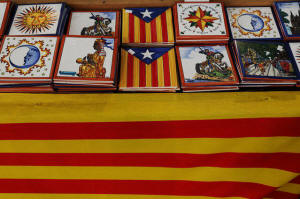|
Catalan parliament to defy Spanish ban on
independence debate, official says
 Send a link to a friend
Send a link to a friend
 [October 06, 2017]
By Sam Edwards and Raquel Castillo [October 06, 2017]
By Sam Edwards and Raquel Castillo
BARCELONA/MADRID (Reuters) - Catalonia's
parliament will defy a Spanish court ban and go ahead on Monday with a
debate that could lead to a declaration of independence, a regional
government official said, as Spain's worst political crisis in decades
looked set to deepen.
"Parliament will discuss, parliament will meet. It will be a debate, and
this is important," the Catalan government's head of foreign affairs,
Raul Romeva, told BBC radio on Friday.
It was the pro-independence regional government's first clear response
to a Constitutional Court decision on Thursday to suspend Monday's
planned parliamentary session, and it raised the prospect of a tough
response from the central government.
Spanish Prime Mariano Rajoy has offered all-party political talks to
find a solution, opening the door to a deal giving Catalonia more
autonomy. But he has ruled out independence and rejected a Catalan
proposal for international mediation.

Spanish ruling-party lawmakers say Rajoy is considering invoking the
constitution to dissolve the regional parliament and force fresh Catalan
elections if the region's government goes ahead with an independence
declaration.
On Thursday, the speaker of the Catalan parliament, Carme Forcadell,
said parliamentary leaders had not yet decided whether to defy the
central court and go ahead with the session.
Romeva told the BBC that the crisis could only be resolved with
politics, not via judicial means.
His remarks hit Spanish stocks and bonds, including shares in the
region's two largest banks, Caixabank <CABK.MC> and Sabadell <SABE.MC>.
Sabadell decided on Thursday to move its legal base to Alicante.
Caixabank <CABK.MC>, Spain's third-largest lender, will consider on
Friday whether to also transfer its legal base away from Catalonia, a
source said.
The court's suspension order further aggravated one of the biggest
crises to hit Spain since the establishment of democracy on the 1975
death of General Francisco Franco.
Secessionist Catalan politicians have pledged to unilaterally declare
independence at Monday's session after staging an independence
referendum last Sunday. Madrid had banned the vote and sought to thwart
it by sending in riot police who use batons and rubber bullets on
voters.
[to top of second column] |

Tiles with the Estelada (Catalan separatist flag) are displayed on a
table covered with a Catalan flag at an arts and craft market four
days after the banned independence referendum, in Barcelona, Spain
October 5, 2017. REUTERS/Susana Vera

In a separate development that could raise tensions, Catalan police
chief Josep Lluis Trapero was summoned to Spain's High Court on
Friday to answer accusations that he committed sedition by failing
to ensure his police enforced a court ban on holding the referendum.
Unlike national police, Catalonia's force, the Mossos d'Esquadra,
did not use force to prevent people voting.
Spanish Economy Minister Luis de Guindos told Reuters in an
interview on Thursday the turmoil was damaging Catalonia, an
industrial and tourism powerhouse which accounts for a fifth of the
national economy.
In addition, two sources said the central government will on Friday
approve a decree making it easier for companies to transfer their
legal base out of the region, potentially dealing a blow to the
region's finances.
Opinion polls conducted before the vote suggest a minority of around
40 percent of residents in Catalonia back independence. But a
majority wanted a referendum to be held, and the violent police
crackdown angered Catalans across the divide.
Catalan officials released preliminary referendum results showing 90
percent support in favor of breaking away.
But turnout was only about 43 percent as Catalans who favor
remaining part of Spain mainly boycotted the ballot.
In an interview with Spanish news agency EFE, Rajoy said the
solution to the crisis was a prompt return to legality and "a
statement as soon as possible that there will not be a unilateral
declaration of independence, because that will also avoid greater
evils."
(Reporting by Elisabeth O'Leary, Paul Day, Andres Gonzalez and
Rodrigo de Miguel; Editing by Mark Bendeich and Hugh Lawson)
[© 2017 Thomson Reuters. All rights
reserved.]
Copyright 2017 Reuters. All rights reserved. This material may not be published,
broadcast, rewritten or redistributed.
 |